Mises, Ludwig von. Human Action: A Treatise on Economics
Подождите немного. Документ загружается.

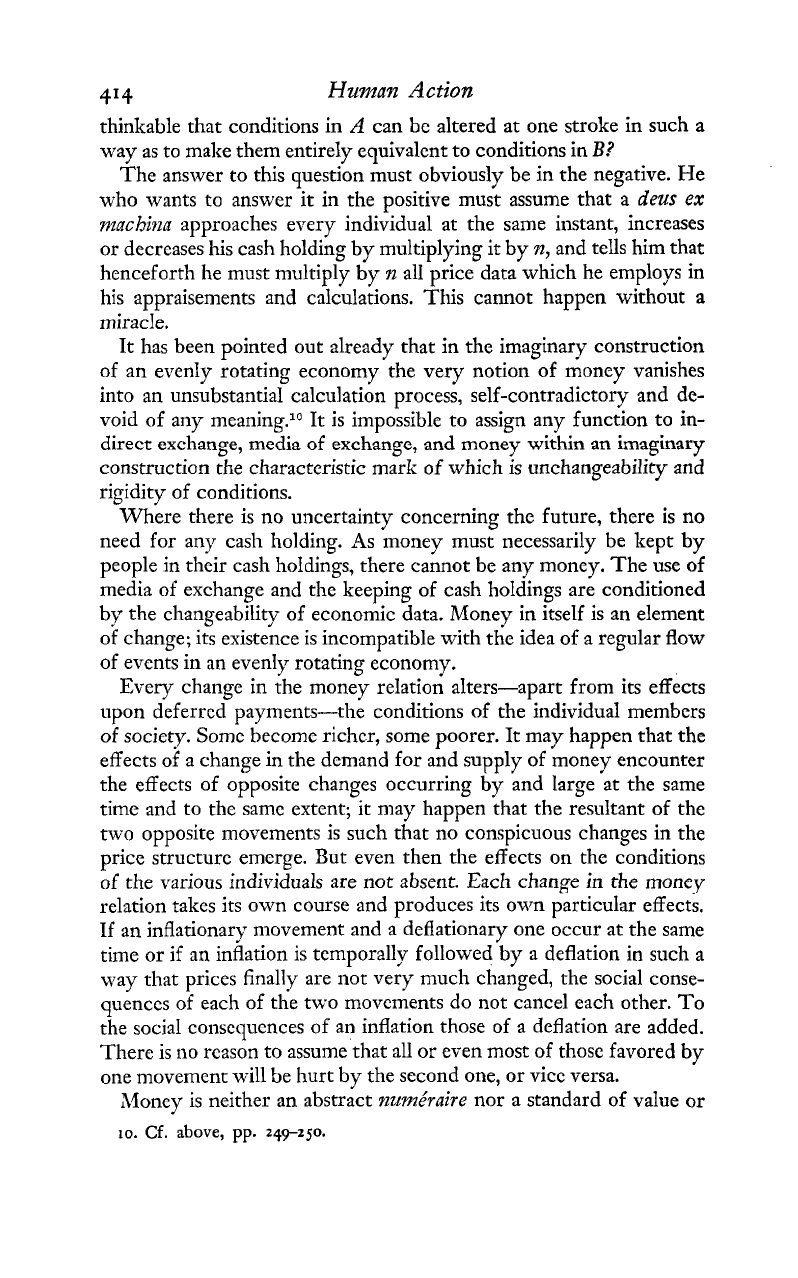
414
Human
Action
thinkable that conditions in
A
can be altered at one stroke in such a
way as to make them entirely equivalent to conditions in
B?
The answer to this question must obviously be in the negative. He
who wants to answer it in the positive must assume that
a
deus
ex
nzacbina
approaches every individual at the same instant, increases
or decreases his cash holding by multiplying it by
n,
and tells him that
henceforth he must multiply by
n
a11 price data which he employs in
his appraisements and calculations. This cannot happen without a
miracle.
It has been pointed out already that in the imaginary construction
of an evenly rotating economy the very notion of moncy vanishes
into an unsubstantial calculation process, self-contradictory and de-
void of any meaning.1° It is impossible to assign any function to in-
direct exchange, media of exchange, and money within an imaginary
construction the characteristic mark of which is unchangeability and
rigidity of conditions.
Where there is no uncertainty concerning the future, there is no
need for any cash holding. As money must necessarily be kept
by
people in their cash holdings, there cannot be any money. The use
of
media of exchange and the keeping of cash holdings are conditioned
by
the changeability of economic data. Money in itself is an element
of change; its existence is incompatible with the idea of a regular flow
of events in an evenly rotating economy.
Every change in the money relation alters-apart from its effects
upon deferred payments-the conditions of the individual members
of society. Some become richer, some poorer. It may happen that the
effects of a change in the demand for and supply of money encounter
the effects of opposite changes occurring by and large at the same
time and to the same extent; it may happen that the resultant of the
two opposite movements is such that no conspicuous changes in the
price structure emerge. But even then the efFects on the conditions
of the various individuals are not absent, Each change in
the
money
relation takcs its own course and produces its own particular effects.
If an inflationary movement and a deflationary one occur at the same
time or if an inflation is temporally followed by a deflation in such a
way that prices finally are not very much changed, the social conse-
quences of each of the two movements do not cancel each other. To
the social consequences of an inflation those of a deflation are added.
There is no reason to assume that all or even most of those favored by
one movement will be hurt by the second one, or vice versa.
Money is neither an abstract
numthire
nor a standard of value or
10.
Cf.
above,
pp.
249-250.
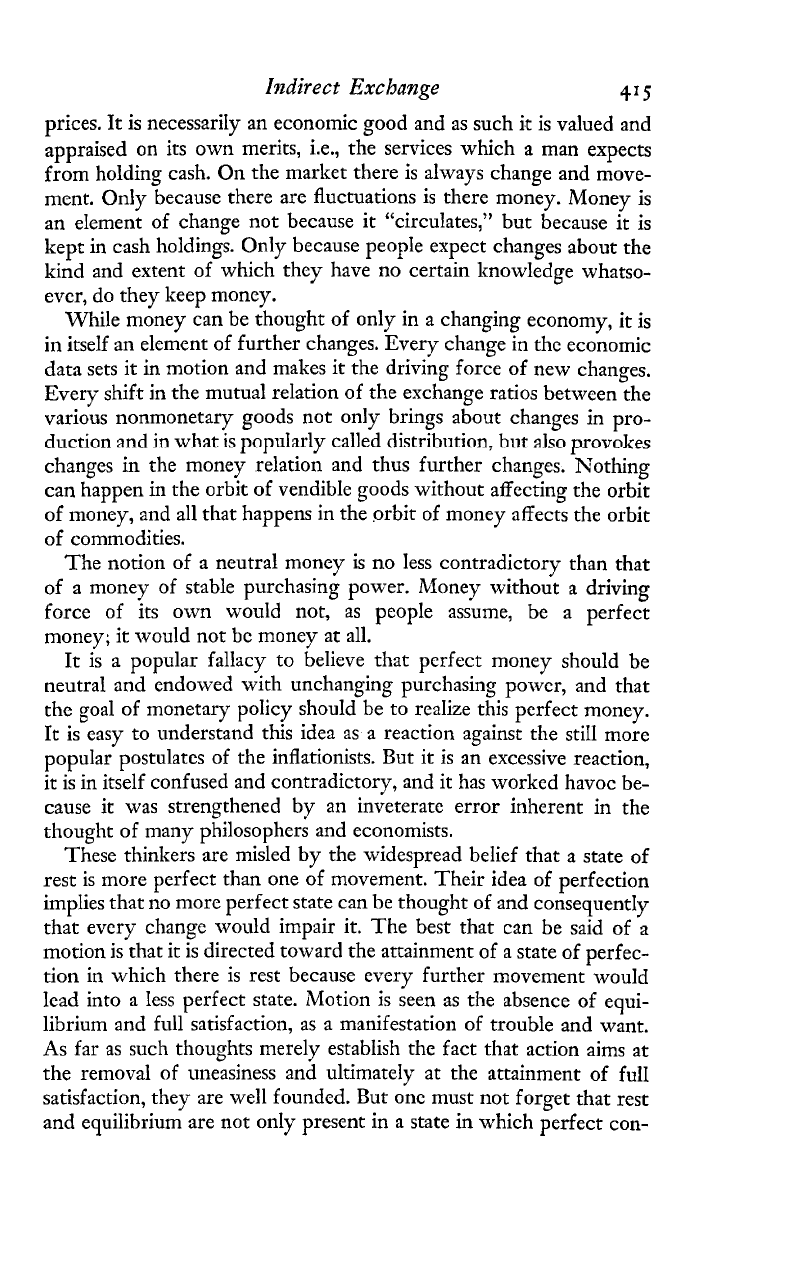
Indirect Exchange
4x5
prices. It is necessarily an economic good and as such it is valued and
appraised on its own merits, i.e., the services which a man expects
from holding cash. On the market there is always change and move-
mcnt. Only because there are fluctuations is there money. Money is
an element of change not because it "circulates," but because it is
kept in cash holdings. Only because people expect changes about the
kind and extent of which thcy have no certain knowledge whatso-
ever, do they keep money.
While money can be thought of only in a changing economy, it is
in itself an element of further changes. Every change in the economic
data sets it in motion and makes it the driving force of new changes.
Every shift in the mutual relation of the exchange ratios between the
various nonmonetary goods not only brings about changes in pro-
duction and
in
what is popularly called distribution, but also provokes
changes
in
the money relation and thus further changes. Nothing
can happen in the orbit of vendible goods without affecting the orbit
of money, and all that happens in the orbit of money affects the orbit
of commodities.
The notion of a neutral money is no less contradictory than that
of a money of stable purchasing power. Money without a driving
force of its own would not, as people assume, be a perfect
money; it would not bc moncy at all.
It is a popular fallacy to believe that perfect money should be
neutral and endowed with unchanging purchasing powcr, and that
the goal of monetary policy should he to realize this perfect money.
It is easy to understand this idea as a reaction against the stiIl more
popular postulates of the inflationists. But it is an excessive reaction,
it is in itself confused and contradictory, and it has worked havoc be-
cause it was strengthened by an inveterate error inherent in the
thought of many philosophers and economists.
These thinkers are misled by the widespread belief that a state of
rest is more perfect than one of movement. Their idea of perfection
implies that no more perfect state can be thought of and consequently
that every change would impair it. The best that can be said of a
motion is that it is directed toward the attainment of a state of perfec-
tion in which there is rest because every further movement would
lead into a less perfect state. Motion is seen as the absence of equi-
librium and full satisfaction, as
a
manifestation of trouble and want.
As far as such thoughts merely establish the fact that action aims at
the removal of uneasiness and ultimately at the attainment of fulI
satisfaction, they are well foundcd. But one must not forget that rest
and equilibrium are not only present in a state in which perfect con-
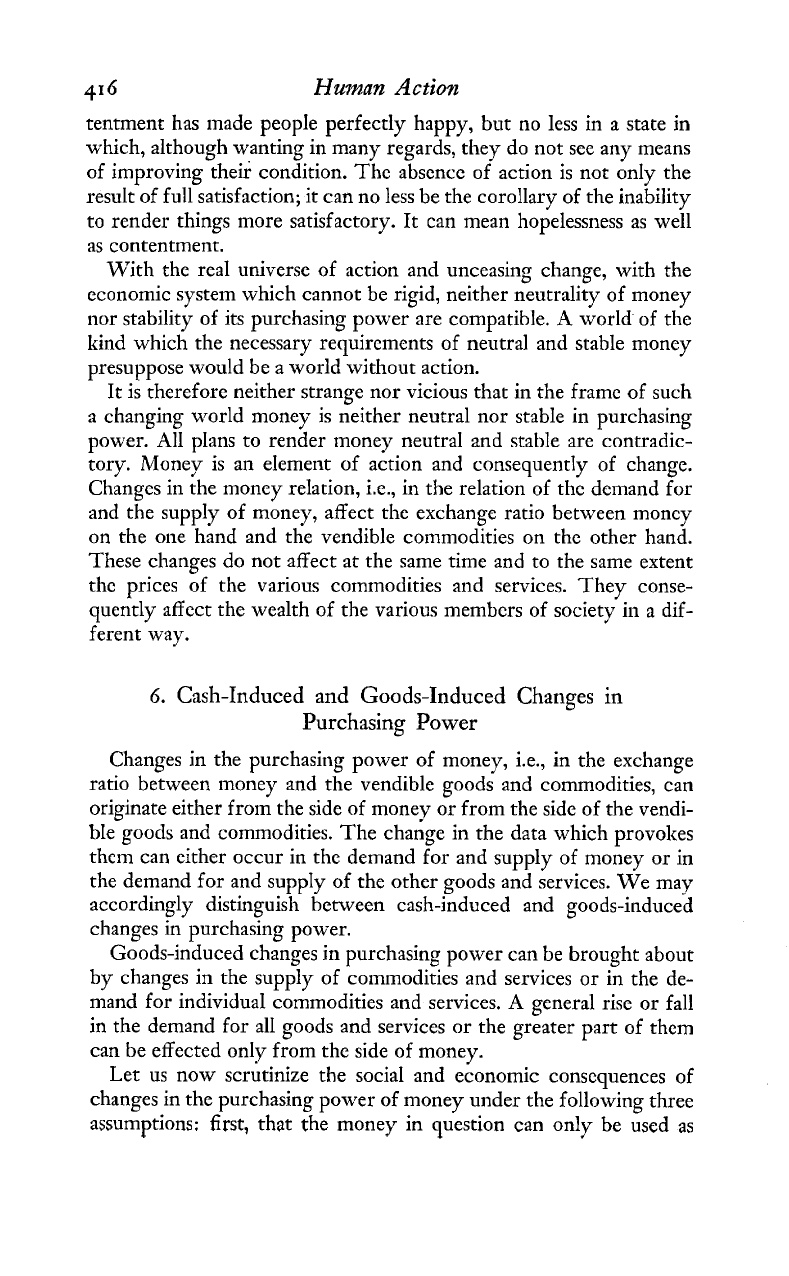
416
Human
Action
tentment has made people perfectly happy, but no less in a state in
which, although wanting in many regards, they do not see any means
of improving their condition. The absence of action is not only the
result of full satisfaction; it can no less be the corollary of the inability
to render things more satisfactory. It can mean hopelessness as well
as contentment.
With the real universe of action and unceasing change, with the
economic system which cannot be rigid, neither neutrality of money
nor stability of its purchasing power are compatible.
A
world of the
kind which the necessary requirements of neutral and stable money
presuppose would be a world without action.
It is therefore neither strange nor vicious that in the frame of such
a changing world money is neither neutral nor stable in purchasing
power. All plans to render money neutral and stable are contradic-
tory. Money is an element of action and consequentIy of change.
Changes in the money relation, it., in the relation of the demand for
and the supply of money, affect the exchange ratio between money
on the one hand and the vendible commodities on the other hand.
These changes do not affect at the same time and to the same extent
the prices of the various commodities and services. They conse-
quently affect the wealth of the various members of society in a dif-
ferent way.
6.
Cash-Induced and Goods-Induced Changes in
Purchasing
Power
Changes in the purchasing power of money, i.e., in the exchange
ratio between money and the vendible goods and commodities, can
originate either from the side of money or from the side of the vendi-
ble goods and commodities. The change in the data which provokes
them can either occur in the demand for and supply of money or in
the demand for and supply of the other goods and services. We may
accordingly distinguish between cash-induced and goods-induced
changes in purchasing power.
Goods-induced changes in purchasing power can be brought about
by changes in the supply of commodities and services or in the de-
mand for individual commodities and services.
A
general rise or fall
in the demand for a11 goods and services or the greater part of them
can
be
effected only from the side of money.
Let us now scritinize the social and economic consequences of
changes in the purchasing power of money under the following three
assumptions: first, that the money in question can only be used as
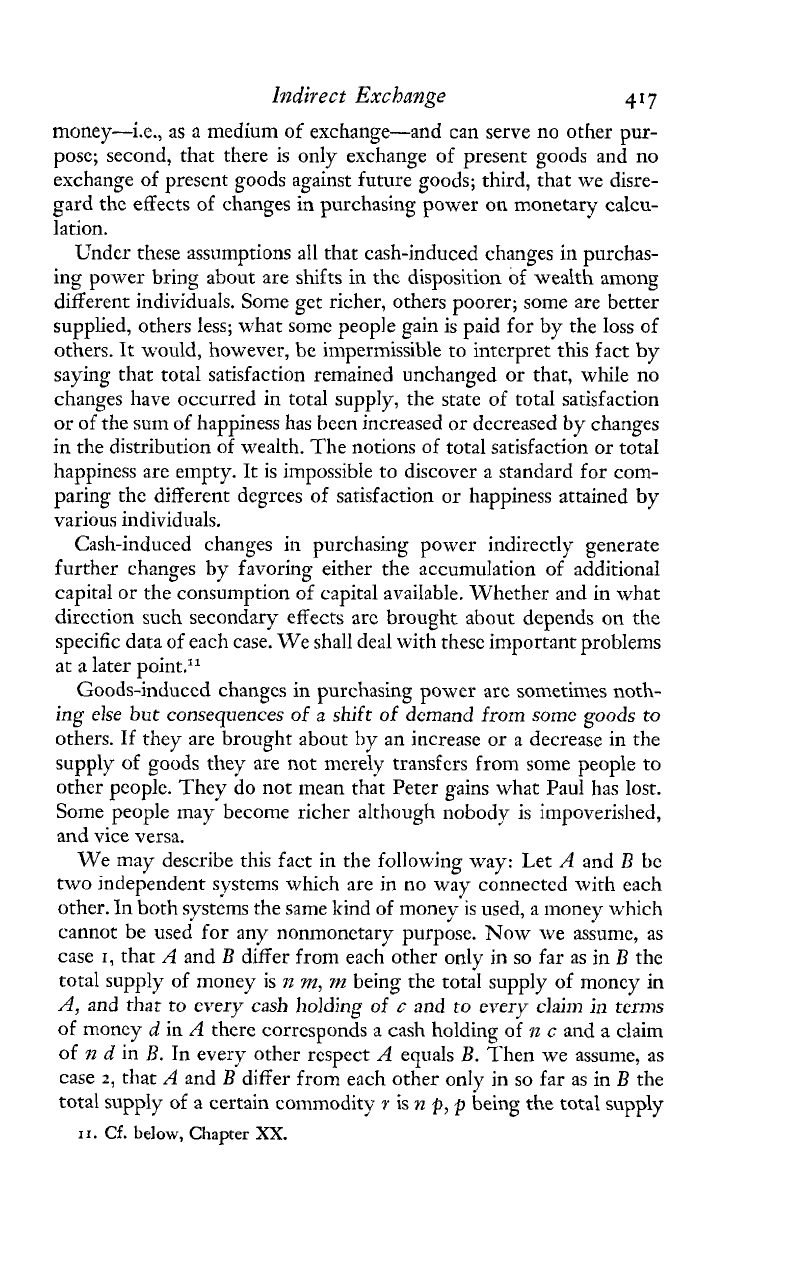
Indirect
Exchange
417
money-ix., as a medium of exchange-and can serve no other pur-
pose; second, that there is only exchange of present goods and no
exchange of present goods against future goods; third, that we disre-
gard the effects of changes in purchasing power on monetary calcu-
lation.
Under these assumptions a11 that cash-induced changes in purchas-
ing power bring about are shifts in the disposition
of
wealth among
different individuals. Some get richer, others poorer; some are better
supplied, others less; what some people gain is paid for by the loss of
others. It would, however, be impermissible to interpret this fact by
saying that total satisfaction remained unchanged or that, while no
changes have occurred in total supply, the state of total satisfaction
or of the sum of happiness has been increased or decreased
by
changes
in the distribution of wealth. The notions of total satisfaction or total
happiness are empty.
It
is impossible to discover a standard for com-
paring the different degrees of satisfaction or happiness attained by
various individuals.
Cash-induced changes
in
purchasing power indirectly generate
further changes by favoring either the accumulation of additional
capital or the consumption of capital avaiIable. Whether and in what
direction such secondary effects arc brought about depends on the
specific data of each case. We shall deal with these important problems
at
a
later point.ll
Goods-induced changes
in
purchasing power
are
sometimes noth-
ing else
but
consequences
of
a
shift
of demand from somc goods to
others. If they are brought about by an increase or a decrease in the
supply of goods they are not merely transfers from some people to
other people. They do not mean that Peter gains what Paul has lost.
Some people mai become richer although nobody is impoverished,
and vice versa.
We
may describe this fact in the following way: Let
A
and
B
be
two independent systems which are
in
no way connected with each
other. In both systcms the same kind of money is used, a money which
cannot be used for any nonmonetary purpose. Now
we
assume, as
case
I,
that
A
and
B
differ from each other only in so far as
in
B
the
total supply of money is
12
nz,
m
being the total supply of money in
A,
and thar to every cash
holding
of
c
and
to
every claim in
terms
of money
d
in
A
there corresponds a cash holding of
n
c
and
a claim
of
n
d
in
B.
In every other respect
A
equals
B.
Then we assume, as
case
2,
that
A
and
B
differ from each other only in so far as in
B
the
total supply
of
a certain commodity
r
is
n
p,
p
being the total supply
11.
Cf.
below,
Chapter
XX.
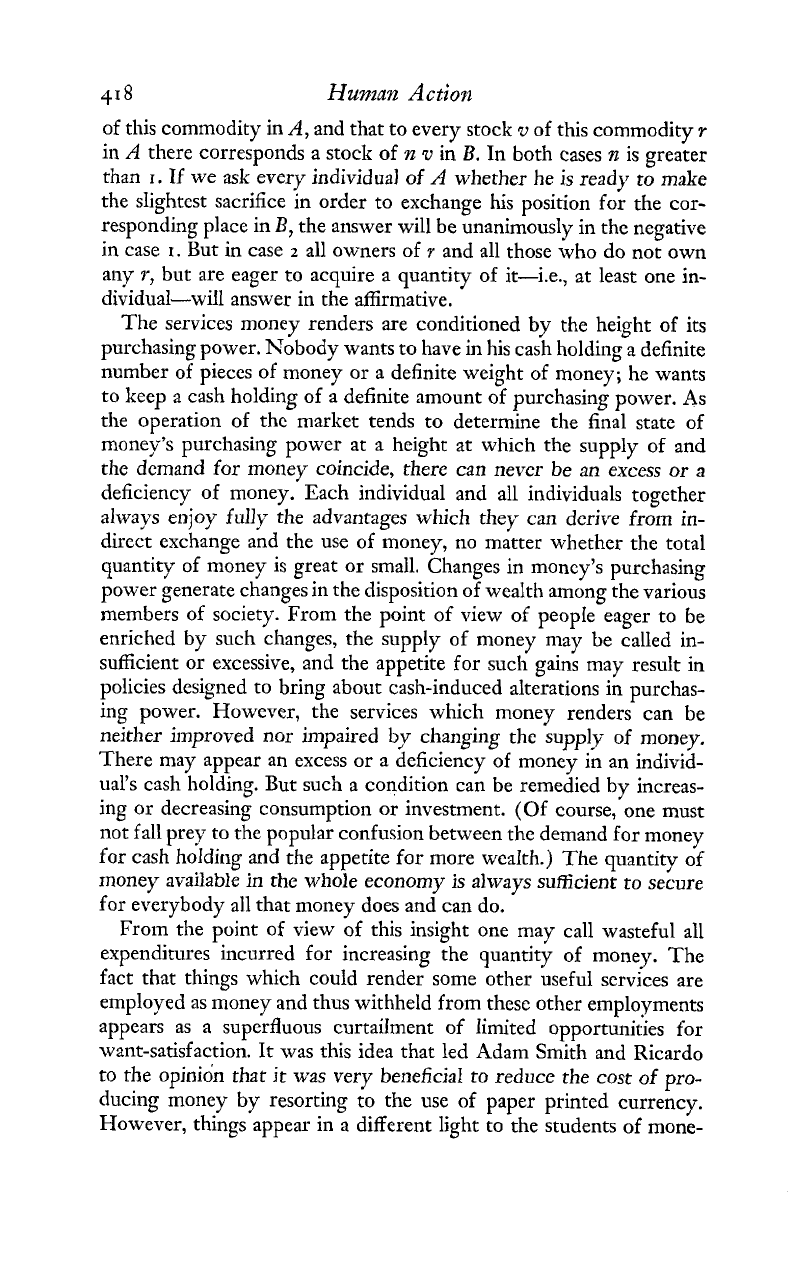
418
Human
Actiofz
of this commodity in
A,
and that to every stock
v
of this commodity
r
in
A
there corresponds a stock
of
n
v
in
B.
In both cases
n
is greater
than
I.
If we ask every individual of
A
whether he
is
ready to make
the slightest sacrifice in order to exchange his position for the cor-
responding place in
B,
the answer will be unanimously in the negative
in case
I.
But in case
z
all owners of
r
and all those who do not own
any
r,
but are eager to acquire a quantity of it-i.e., at least one in-
dividual-will answer in the affirmative.
The services money renders are conditioned by the height
of
its
purchasing power. Nobody wants to have in his cash holding a definite
number of pieces of money or a definite weight of money; he wants
to keep a cash holding of a definite amount of purchasing power. As
the operation of the market tends to determine the final state of
money's purchasing power at a height at which the supply of and
the dcmand for money coincide, there can never be an excess or
a
deficiency of money. Each individual and all individuals together
always enjoy fully the advantages which they can derive from in-
direct exchange and the use of money, no matter whether the total
quantity of money is great or small. Changes in money's purchasing
power generate changes in the disposition of wealth among the various
members of society. From the point of view of people eager to be
enriched by such changes, the supply of money may be called in-
sufficient or excessive, and the appetite for such gains may result in
policies designed to bring about cash-induced alterations in purchas-
ing power. However, the services which money renders can be
neither improved nor impaired
by
changing the
supply
of money.
There may appear an excess or a deficiency of money in an individ-
ual's cash holding. But such a condition can be remedied by increas-
ing
or
decreasing consumption or investment. (Of course, one must
not fall prey to the popular confusion between the demand for money
for cash hilding and the appetite for more wealth.) The quantity of
money available in the whole economy is always sufficient to secure
for everybody all that money does and can do.
From the point of view of this insight one may call wasteful all
expenditures incurred for increasing the quantity of money. The
fact that things which could render some other useful services are
employed as money and thus withheld from these other employments
appears as a superfluous curtailment of Iimited opportunities for
want-satisfaction. It was this idea that led Adam Smith and Ricardo
to
the
opinion that it was very beneficial to reduce the cost of pro-
ducing money by resorting to the use of paper printed currency.
However, things appear in a different light to the students of mone-
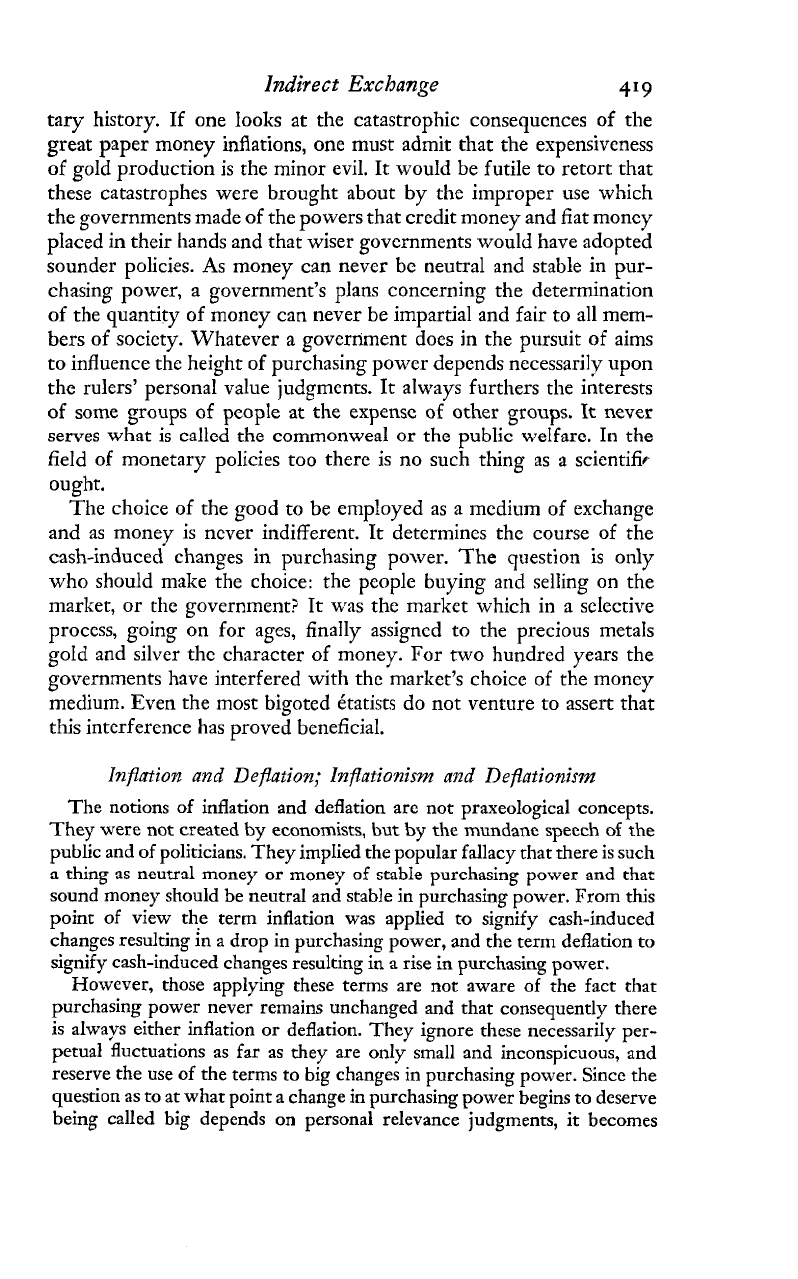
Indirect
Exchange
419
tary history. If one looks at the catastrophic consequences of the
great paper money inflations, one must admit that the expensiveness
of gold production is the minor evil. It would be futile to retort that
these catastrophes were brought about by the improper use which
the governments made of the powers that credit money and fiat money
pIaced in their hands and that wiser governments would have adopted
sounder policies. As money can never be neutral and stable in pur-
chasing power, a government's plans concerning the determination
of the quantity of money can never be impartial and fair to all mem-
bers of society. Whatever a government does in the pursuit of aims
to influence the height of purchasing power depends necessarilv upon
the rulers' personal value judgments. It always furthers the interests
of some groups of people at
the
expense of other groups.
It
never
serves what is called the commonweal or the public weIfare.
In
the
field of monetary policies too there is no such thing as a scientifir
ought.
The choice of the good to be employed as a medium of exchange
and as money is never indifferent. It determines the course of the
cash-induced changes in purchasing power. The question is only
who should make the choice: the people buying and selling on the
market, or the government? It was the market w-hich in a selective
process, going on for ages, finally assigned to the precious metals
gold and silver the character of money. For two hundred years the
governments have interfered with the market's choice of the money
medium. Even the most bigoted Ctatists do not venture to assert that
this interference has proved beneficial.
Inflation and Deflation; Inflationism
and
Depntionism
The notions of inflation and deflation are not praxeological concepts.
They were not created
by
economists,
but
by
the mundane speech
of
the
public and of politicians. They impIied the popular fallacy that there is such
a thing as neutral money or money of stabIe purchasing power and that
sound money should be neutral and stable in purchasing power. From this
point of view the term inflation was applied to signify cash-induced
changes resulting in
a
drop in purchasing power, and the term deflation to
signify cash-induced changes resulting in
a
rise in purchasing power.
However, those applying these terms are not aware of the fact that
purchasing power never remains unchanged and that consequently there
is always either inflation or deflation. They ignore these necessarily per-
petual fluctuations as far as they are only small and inconspicuous, and
reserve the use of the terms to big changes in purchasing power. Since the
question as to at what point a change
in
purchasing power begins to deserve
being called big depends on personal relevance judgments, it becomes
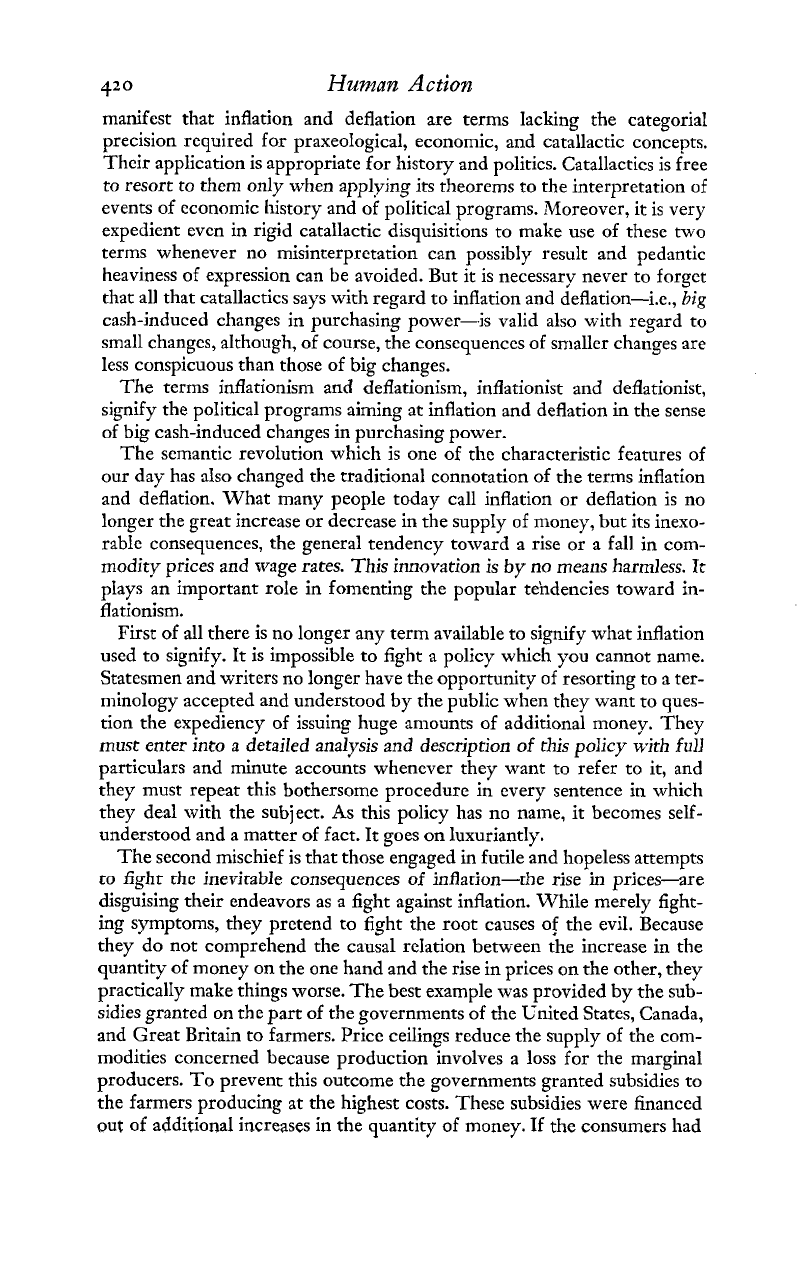
420
Human
Action
manifest that inflation and deflation are terms lacking the categorial
precision required for praxeoIogica1, economic, and catallactic concepts.
Their application is appropriate for history and politics. Catallactics is free
to resort to them only when applying its theorems to the interpretation of
events of economic history and of political programs. Moreover, it is very
expedient even in rigid catallactic disquisitions to make use of these two
terms whenever no misinterpretation can possibly result and pedantic
heaviness of expression can be avoided. But it is necessary never to forget
that all that catallactics says with regard to inflation and deflation-i.e.,
big
cash-induced changes in purchasing power-% valid also with regard to
small changes, although, of course, the consequences of smaller changes are
less conspicuous than those of big changes.
The terms inflationism and deflationism, inflationist and deflationist,
signify the poIitica1 programs aiming at inflation and deflation in the sense
of big cash-induced changes in purchasing power.
The semantic revolution which is one of the characteristic features of
our day has also changed the traditional connotation of the terms inflation
and deflation. What many people today call inflation or deflation is no
longer the great increase or decrease in the supply of money, but its inexo-
rable consequences, the general tendency toward a rise or a fall in com-
modity prices and wage rates. This innovation is
by
no means harmless.
It
plays an important role in fomenting the popular tehdencies toward in-
flationism.
First of all there is no longer any term available to signify what inflation
used to signify. It is impossible to fight a policy which you cannot name.
Statesmen and writers no longer have the opportunity of resorting to a ter-
minology accepted and understood by the public when they want to ques-
tion the expediency of issuing huge amounts of additional money. They
must enter into a detailed analysis and description of this policy with full
particulars and minute accounts whenever they want to refer to it, and
they must repeat this bothersome procedure in every sentence in which
they deal with the subject.
As
this policy has no name, it becomes self-
understood and a matter of fact. It goes on luxuriantly.
The second mischief is that those engaged in futile and hopeless attempts
to
fight
the inevitable consequences of inflation-the rise
in
prices-are
disguising their endeavors as a fight against inflation. While merely fight-
ing symptoms, they pretend to fight the root causes of the evil. Because
they do not comprehend the causal relation betw-een the increase in the
quantity of money on the one hand and the rise in prices on the other, they
practicalIy make things worse. The best example was provided by the sub-
sidies granted on the part of the governments of the United States, Canada,
and Great Britain to farmers. Price ceilings reduce the supply of the com-
modities concerned because production involves a loss for the marginal
producers. To prevent this outcome the governments granted subsidies to
the farmers producing at the highest costs. These subsidies were financed
out of additional increases in the quantity of money. If the consumers had
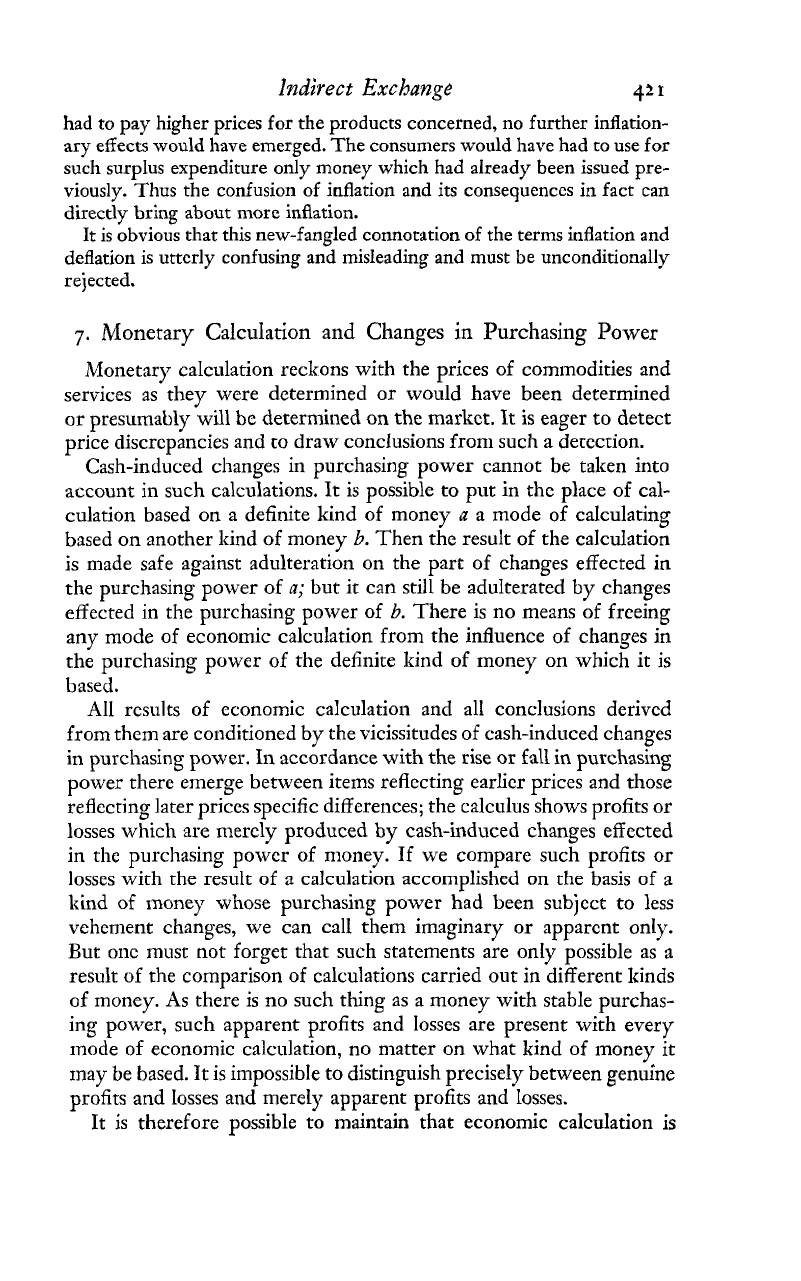
lndirect Exchange
42
1
had to pay higher prices for the products concerned, no further inflation-
ary effects would have emerged. The consumers would have had to use for
such surplus expenditure only money which had already been issued pre-
viously. Thus the confusion of inflation and its consequences in fact can
directly bring about more inflation.
It is obvious that this new-fangled connotation of the terms inflation and
deflation is utterly confusing and misleading and must be unconditionally
rejected.
7.
Monetary Calculation and Changes in Purchasing Power
Monetary calculation reckons with the prices of commodities and
services as they were determined or would have been determined
or presumably will be determined on the market.
It
is eager to detect
price discrepancies and to draw conclusions from such
a
detection.
Cash-induced changes in purchasing power cannot be taken into
account in such calculations.
It
is possible to put in the place of cal-
culation based on a definite kind of money
a
a mode of calculating
based on another kind of money
b.
Then the result of the calculation
is made safe against adulteration on the part of changes effected in
the purchasing power of
a;
but it can still be adulterated by changes
effected in the purchasing power of
b.
There is no means of freeing
any mode of economic calculation from the influence of changes in
the purchasing power of the definite kind of money on which it is
based.
All results of economic calculation and all conclusions derived
from them are conditioned by the vicissitudes of cash-induced changes
in purchasing power. In accordance with the rise or
fall
in
purchasing
power there emerge between items reflecting earlier prices and those
reflecting later prices specific diffcrences; the calculus shows profits or
losses which are mercly produced by cash-induced changes effected
in the purchasing power of money. If we compare such profits or
losses with the result of
3
calculation accomplished on the basis of a
kind of money whose purchasing power had been subject to less
vehement changes, we can call them imaginary or apparent only.
But om must not forget that such statements are only possible as a
result of the comparison of calculations carried out in different kinds
of money. As there is no such thing as a money with stable purchas-
ing pourer, such apparent profits and losses are present with every
mode of economic calculation, no matter on what kind of money it
may be based. It is in~possible to distinguish precisely between genuine
profits and losses and merely apparent profits and losses.
It is therefore possible to maintain that economic calculation
is
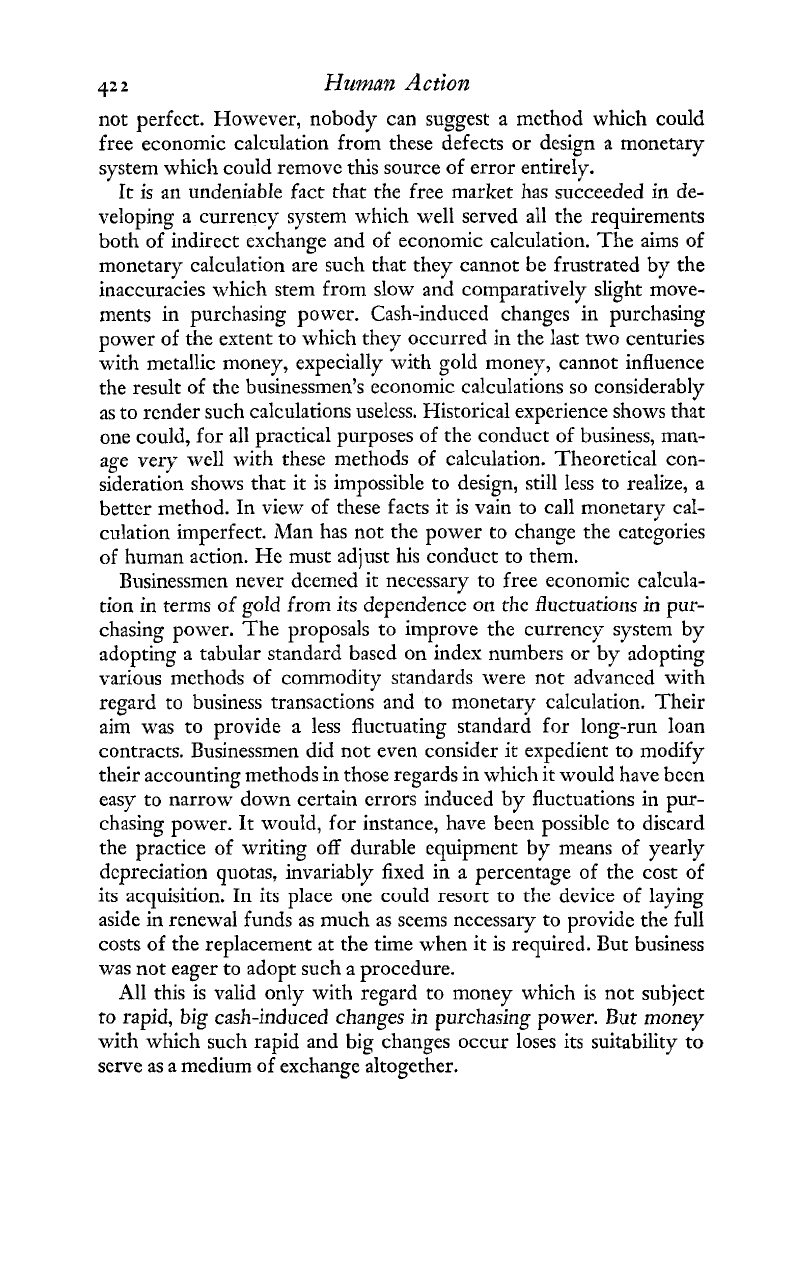
422
Human
Action
not perfect. However, nobody can suggest a method which could
free economic calculation from these defects or design a monetary
system which could remove this source of error entirely.
It is an undeniable fact that the free market has succeeded in de-
veloping a currency system which well served all the requirements
both of indirect cxchange and of economic calculation. The aims of
monetary calculation are such that thcy cannot be frustrated by the
inaccuracies which stem from slow and comparatively slight move-
ments in purchasing power. Cash-induced changes in purchasing
power of the extent to which they occurred in the last two centuries
with metallic money, expecially with gold money, cannot influence
the result of the businessmen's economic calculations so considerably
as to render such calculations useless. Historical experience shows that
one could, for all practical purposes of the conduct of business, man-
age very well with these methods of calculation. Theoretical con-
sideration shows that it is impossible to design, still less to realize, a
better method. In view of these facts it is vain to call monetary cal-
culation imperfect. Man has not the power to change the categories
of human action. He must adjust his conduct to them.
Businessmen never dcemed it necessary to free economic calcula-
tion in terms of gold from its dependence on the fluctuations in pur-
chasing power. The proposals to improve the currency system by
adopting a tabular standard based on index numbers or by adopting
various methods of commodity standards were not advanced with
regard to business transactions and to monetary calculation. Their
aim was to provide a less fluctuating standard for long-run loan
contracts. Businessmen did not even consider it expedient to modify
their accounting methods in those regards in which it would have been
easy to narrow down certain errors induced
by
fluctuations in pur-
chasing power. It would, for instance, have been possible to discard
the practice of writing off durable equipment by means of yearly
depreciation quotas, invariably fixed in a percentage of the cost of
its acquisition. In its place one could resort to the device of laying
aside in renewal funds as much as seems necessary to provide the full
costs
of
the replacement at the time when it is required. But business
was not eager to adopt such a procedure.
All this is valid only with regard to money which is not subject
to
rapid, big cash-induced changes
in
purchasing power.
But
money
with which such rapid and big changes occur loses its suitability to
serve as a medium of exchange altogether.
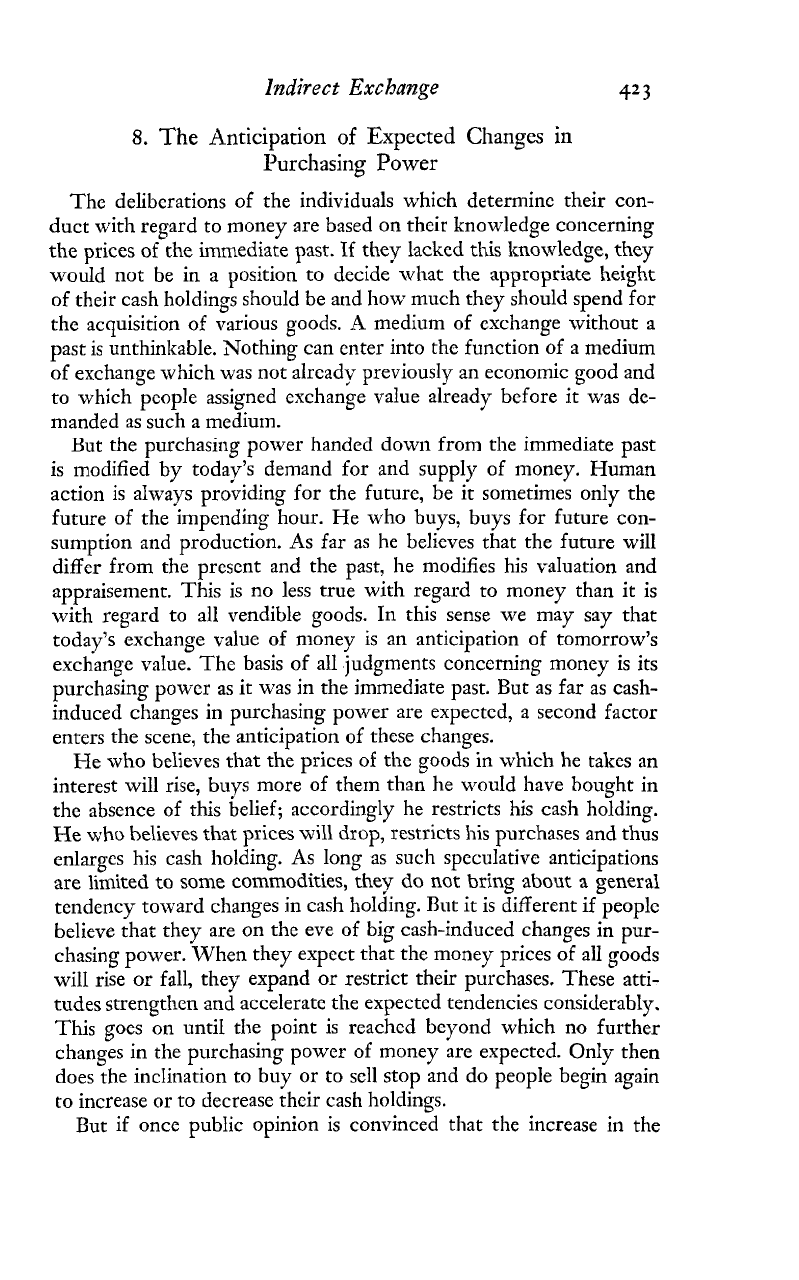
lndirect
Exchange
8.
The Anticipation of Expected Changes
in
Purchasing Power
The deliberations of the individuals which determine their con-
duct with regard to money are based on their knowledge concerning
the prices of the immediate past. If they lacked this knowledge, they
would not be in a position to decide what the appropriate height
of their cash holdings should be and how much they should spend for
the acquisition of various goods.
A
medium of exchange without a
past is unthinkable. Nothing can enter into the function of a medium
of exchange which was not already previously an economic good and
to which people assigned exchange value already before it was de-
manded as such a medium.
But the purchasing power handed down from the immediate past
is modified by today's demand for and supply of money. Human
action is always pr&iding for the future, be it sometimes only the
future of the impending hour. He who buys, buys for future con-
sumption and production. As far as he believes that the future will
differ from the present and the past, he modifies his vahation and
appraisement. This is no less true with regard to money than it is
with regard to all vendible goods. In this sense we may say that
today's exchange value of money is an anticipation of tomorrow's
exchange vaIue. The basis of all judgments concerning money is its
purchasing power as it was in the immediate past. But as far as cash-
induced changes in purchasing power are expected, a second factor
enters the scene, the anticipation of these changes.
He
who
believes that the prices of the goods in whkh he takes an
interest will rise,
buys
more of them than he would have bought in
the absence of this Lelief; accordingly he restricts his cash holding.
He who believes that prices
will
drop, restricts his purchases and thus
enlarges his cash holding. As long as such speculative anticipations
are limited to some commodities, they do not bring about
a
general
tende~lcy toward changes in cash holding. But it is different if people
believe that they are on the eve of big cash-induced changes in pur-
chasing power. When they expect that the money prices of all goods
will rise or fall, they expand or restrict their purchases. These atti-
tudes strengthen and accelerate the expected tendencies considerably.
This goes on until the point is reached beyond which no further
changes in the purchasing power of money are expected. Only then
does the inclination to buy or to sell stop and do people begin again
to increase or to decrease their cash holdings.
But if once public opinion is convinced that the increase in the
